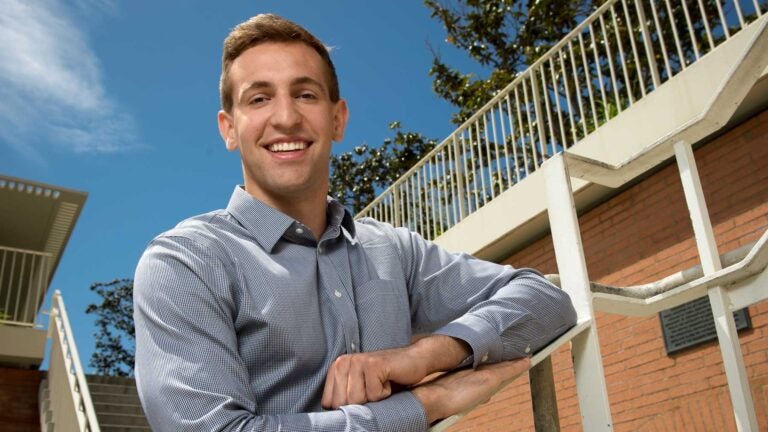
Jack Huebner will study at Tsinghua University in Beijing, then plans to work in Africa. (Photo/Gus Ruelas)
Scholar without borders bridges three continents to improve health care
Jack Huebner aims to advance medicine in sub-Saharan Africa
Growing up in Vancouver, British Columbia, Jack Huebner was drawn to the city’s vibrant Chinatown district, where he watched colorful new year celebrations as a child. Now he’s headed to Tsinghua University in Beijing as a prestigious Schwarzman Scholar.
Huebner, a USC Presidential Scholar and assistant captain of the men’s USC ice hockey team, majored in human biology with a French minor. He now wants to better understand the Chinese approach to health care.
“China has developed under a different style of governance, so I want to see how they compare,” Huebner said. “By being in the country, I can get a different perspective because when we learn here it’s through a western filter.”
Huebner will take courses in Mandarin over the summer to prepare for academic and social life in Beijing. Ultimately, he plans to return to Africa, where he has conducted epidemiology studies on burn care, as a physician and a team member of Doctors Without Borders.
A global science perspective
Huebner believes China’s key role in sub-Saharan Africa’s economic development makes the country uniquely suited to support non-governmental organizations that provide health care.
“China is expanding trade and research initiatives, and building infrastructure in Sub-Saharan Africa, while NGOs are suffering a lack of support from the west,” Huebner said. “If there’s a better understanding between NGOs and China, we could do more.”
Katie Capra, USC associate director of academic honors and fellowships, said Huebner has an unusual ability to bring disciplinary, cultural and scientific elements together to solve problems.
“Jack was a unique candidate because he approached the question ‘Why China?’ from a scientific lens,” Capra said. “He was able to articulate how his studies of human biology and French were informing his leadership experiences as an athlete, international student, fraternity member and future physician.
Jack’s intellectual curiosity and character speak to his potential.
Katie Capra
“Jack’s intellectual curiosity and character speak to his potential to go on to not only identify gaps in the quality of primary care, but also address these issues across nations.”
Huebner, whose older brother graduated from the USC Marshall School of Business, is one of 129 students from 30 countries chosen for the Schwarzman program. Alumnus Matt Prusak ’15 was also selected.
“The whole idea behind the program is to foster a relationship between the U.S. and China for future leaders,” Huebner said. “The main reason I wanted to go into Schwarzman is because there are incredible leadership courses there. I really wanted to flesh out my leadership style more, understand it more and see what others have done. I want to see it from their perspective.”
